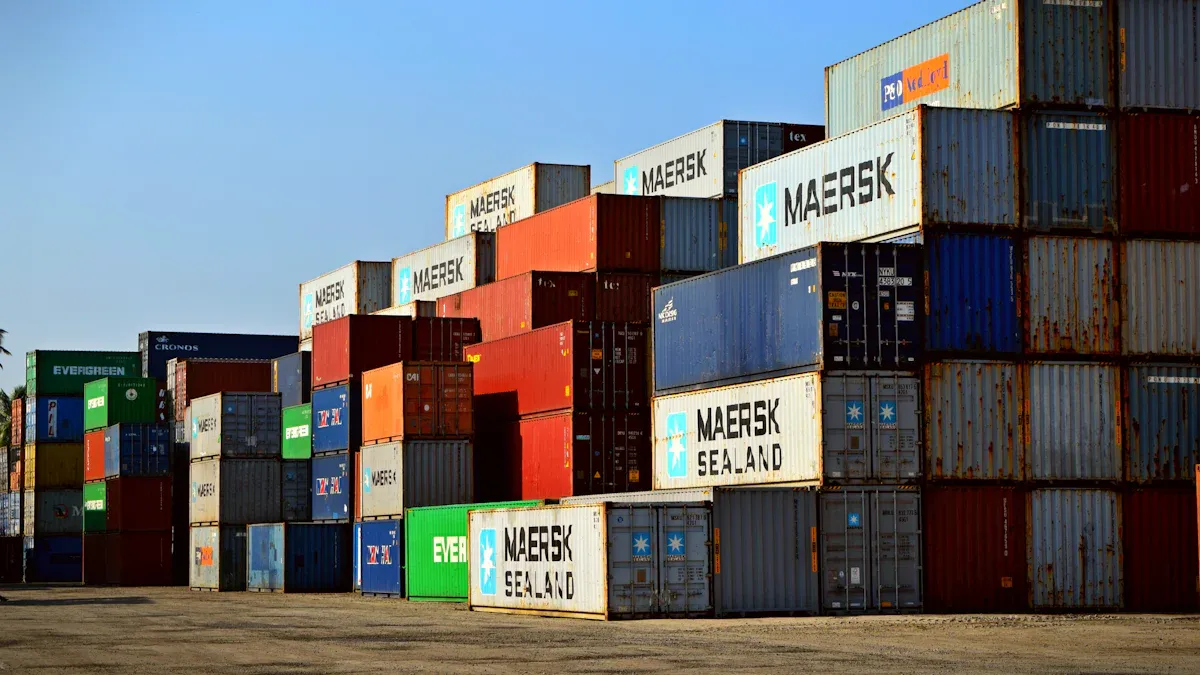The Data-Driven Supply Chain: Unleashing the Power of AI for Optimization and Efficiency

Artificial intelligence (AI) is revolutionizing supply chain management by enhancing efficiency and precision. Businesses leveraging AI report remarkable improvements in operations. For instance, demand forecasting accuracy has improved for 90% of companies, with average error reductions of 25%. Inventory optimization has also seen significant gains, with 85% of businesses reducing inventory levels and improving turnover rates. These advancements underscore the critical need for companies to embrace AI-driven solutions.
In this evolving landscape, adopting a data-driven supply chain approach has become essential for staying competitive. JUSDA and its JusLink platform exemplify this transformation. By integrating AI with supply chain processes, they empower businesses to achieve real-time insights, optimize logistics, and enhance decision-making.
Challenges of Traditional Supply Chains
Inefficiencies in Manual Processes
Traditional supply chains often rely on manual operations, which can lead to significant inefficiencies. Manual procurement processes are prone to errors and delays, resulting in longer order-fulfillment times and late payments. These delays can disrupt cash flow and reduce operational efficiency. Additionally, over-reliance on spreadsheets introduces further complications. Studies reveal that 94% of spreadsheets contain errors, which can derail forecasts and disrupt supply chain operations. Poor warehouse and inventory management also contribute to inefficiencies, causing stockouts or overstocking. These issues create congestion and delays, ultimately impacting the overall performance of the supply chain.
Tip: Automating repetitive tasks can significantly reduce errors and improve efficiency in supply chain operations.
Lack of Visibility Across the Supply Chain
Limited visibility remains a critical challenge in conventional supply chains. Only 7% of supply chains currently support real-time decision-making, leaving most businesses unable to respond quickly to disruptions. Furthermore, 60% to 80% of companies identify better visibility into orders, inventory, and shipments as a top priority. Without real-time insights, businesses struggle to track shipments, monitor inventory levels, and anticipate potential disruptions. This lack of transparency hinders effective decision-making and reduces the ability to adapt to changing market conditions.
Inaccurate Demand Forecasting and Planning
Inaccurate demand forecasting poses another significant challenge for traditional supply chains. Poor data collection and communication often lead to forecasting errors, resulting in unstable inventory levels. Businesses may face excess stock, leading to high storage costs, or stockouts, causing lost sales and dissatisfied customers. These inaccuracies increase operational costs and complicate inventory management. The inability to predict demand accurately also disrupts production schedules and reduces overall efficiency.
A data-driven supply chain approach can address these challenges by leveraging advanced technologies like AI to enhance forecasting accuracy, improve visibility, and streamline operations.
High Operational Costs and Delays
Traditional supply chains often face high operational costs and delays, which significantly impact business performance. Disruptions in the supply chain lead to increased expenses and lost revenue. Companies frequently incur additional costs by hiring temporary staff or expediting shipments to meet deadlines. Production slowdowns caused by these disruptions result in shortages and missed sales opportunities, further straining resources.
Several external factors exacerbate these challenges. Labor disputes at 36 ports along the East and Gulf Coasts caused significant operational disruptions. These disputes delayed shipments and increased costs for businesses relying on timely deliveries. Geopolitical tensions in the Red Sea added to shipping delays and raised insurance premiums, further inflating operational expenses. Extreme weather events, such as droughts affecting the Panama Canal, restricted vessel transit and disrupted the global flow of goods.
Note: External factors like labor disputes and extreme weather events can have a cascading effect on supply chain efficiency.
Delays in material procurement also contribute to higher costs. In April 2024, the average lead time for production materials was 79 days. Although this marked a 21% improvement from the peak of 100 days in July 2022, it remained higher than the 2019 average of 65 days. Industry leaders predict global shipping deliveries could face delays of up to 20 days, further complicating supply chain operations.
These inefficiencies highlight the need for businesses to adopt advanced technologies. AI-driven solutions, such as JusLink’s intelligent supply chain platform, offer tools to mitigate delays and optimize costs. By leveraging real-time data and predictive analytics, companies can enhance decision-making and build more resilient supply chains.
The Role of AI in the Data-Driven Supply Chain

Real-Time Insights for Smarter Decision-Making
AI empowers businesses with real-time insights, enabling smarter decision-making across supply chain operations. By analyzing vast amounts of data, AI tools provide actionable intelligence that enhances efficiency and responsiveness.
Real-time data allows businesses to forecast demand accurately, helping them adapt to market fluctuations.
Inventory levels can be balanced effectively, reducing the risks of oversupply or undersupply and leading to significant cost savings.
AI tools also analyze customer preferences and trends, enabling businesses to align supply with demand and improve customer satisfaction.
Additionally, AI evaluates vendor performance and compliance, ensuring reliable partnerships. It provides real-time risk insights, helping businesses build resilient supply chains. These capabilities make AI an indispensable tool in the modern data-driven supply chain.
Predictive Analytics for Proactive Problem-Solving
Predictive analytics transforms supply chain management by enabling proactive problem-solving. This technology uses data mining and time series forecasting to anticipate potential disruptions and customer demand fluctuations. Businesses can then take preemptive actions to mitigate risks and maintain operational continuity.
A recent study revealed that 77% of logistics partners invest in predictive analytics to boost profitability. This highlights its growing importance in supply chain management. Predictive analytics improves visibility, enhances decision-making, and reduces costs. For example, it helps businesses plan for future market conditions, ensuring adequate inventory levels and avoiding stockouts. These benefits contribute to a more responsive and resilient supply chain.
Automation and Efficiency in Supply Chain Operations
Automation plays a pivotal role in enhancing efficiency within supply chain operations. Companies like Amazon and Walmart have successfully implemented automation to optimize processes. Amazon uses robotics and machine learning in its fulfillment centers, speeding up picking and packing while reducing costs. Walmart employs automated systems for route optimization and inventory management, improving accuracy and efficiency.
In another example, a leading e-commerce retailer in the Southern United States automated its warehousing operations. This resulted in faster order processing and improved supply chain efficiency. Automation not only accelerates operations but also minimizes errors, making it a cornerstone of the data-driven supply chain.
JusLink’s AI-Driven Control Tower: A Game-Changer
JusLink’s AI-driven control tower redefines supply chain management by integrating advanced technologies to deliver unparalleled efficiency and visibility. This innovative platform empowers businesses to monitor, analyze, and optimize every aspect of their supply chain operations.

JUSDA Solutions
To provide you with professional solutions and quotations.
Key Features of JusLink’s Control Tower
Data Empowerment: JusLink leverages over two decades of supply chain expertise to provide real-time, accurate, and diverse data. This data spans procurement, production, warehousing, transportation, and sales, enabling businesses to make informed decisions.
AI-Driven Insights: The platform uses predictive engines to forecast demand, identify risks, and optimize inventory levels. These insights enhance responsiveness and reduce operational disruptions.
End-to-End Visibility: JusLink offers comprehensive tracking across the supply chain, ensuring transparency in shipments, inventory, and vendor performance.
Note: Real-time data and AI insights help businesses adapt quickly to market changes, ensuring resilience and agility.
Benefits of JusLink’s Control Tower
Benefit | Impact |
|---|---|
Enhanced Decision-Making | Businesses gain actionable insights for smarter planning and execution. |
Cost Optimization | Predictive analytics reduce waste and improve resource allocation. |
Risk Mitigation | Early warnings enable proactive responses to potential disruptions. |
Improved Collaboration | Seamless data sharing fosters stronger partnerships across the supply chain. |
JusLink’s control tower transforms supply chains into dynamic ecosystems. It empowers businesses to anticipate challenges, streamline operations, and achieve sustainable growth.
Real-World Impact
A leading electronics manufacturer reported a 20% reduction in logistics costs after implementing JusLink’s control tower. The platform improved demand forecasting accuracy and enhanced inventory management, resulting in faster response times and reduced risks.
JusLink’s AI-driven control tower exemplifies the future of supply chain management. By combining data, AI, and real-time visibility, it equips businesses with the tools needed to thrive in a competitive landscape.
Benefits of AI-Driven Supply Chains
Cost Efficiency and Resource Optimization
AI-driven supply chains significantly enhance cost efficiency and resource optimization. By leveraging advanced analytics, businesses can reduce waste, streamline operations, and allocate resources more effectively. For instance, Coop utilized AI technologies to achieve a 43% reduction in food waste. Renault also improved supply chain visibility, which led to reduced inventory costs and better logistics management.
Company | Improvement Type | Percentage Improvement |
|---|---|---|
Coop | Food waste reduction | 43% |
Renault | Cost of inventory reduction | N/A |
Renault | Improved logistics management | N/A |
These examples highlight how AI transforms supply chain operations, enabling businesses to optimize resources and reduce operational expenses.
Tip: Implementing AI-powered tools like predictive analytics can help businesses identify inefficiencies and allocate resources more effectively.
Improved Customer Satisfaction Through Faster Deliveries
AI enhances customer satisfaction by ensuring faster and more reliable deliveries. Route optimization powered by AI analyzes real-time data to identify the most efficient delivery paths. This reduces delays and provides accurate estimated times of arrival (ETAs), improving the overall customer experience.
AI-powered route optimization reduces delivery times, ensuring timely deliveries and enhancing customer satisfaction.
Streamlined processes facilitated by AI systems make deliveries faster and safer, meeting customer expectations.
A study revealed that 212.5 out of 250 observations indicated customers were very or somewhat satisfied due to AI-enhanced supply chains.
These advancements demonstrate how AI-driven solutions improve delivery efficiency, fostering stronger customer relationships.
Scalability and Adaptability to Market Changes
AI-driven supply chains excel in scalability and adaptability, making them ideal for businesses navigating dynamic markets. Cloud-based technologies integrated with AI allow systems to scale effortlessly, accommodating growing business needs.
AI systems adapt to evolving complexities, ensuring seamless operations for expanding businesses.
Cloud-based platforms provide the flexibility needed to handle fluctuating demands and market conditions.
Scalable AI solutions require a significant number of initial users or systems to maximize their impact.
By leveraging these capabilities, businesses can remain agile and responsive, ensuring long-term success in a competitive landscape.
The integration of AI into supply chain management exemplifies the transformative potential of a data-driven supply chain. Businesses adopting these technologies can achieve cost efficiency, enhance customer satisfaction, and adapt to changing market demands with ease.
Enhanced Sustainability and Reduced Waste
AI-driven supply chains play a pivotal role in promoting sustainability and reducing waste. By leveraging advanced technologies, businesses can minimize their environmental footprint while optimizing operations. AI tools analyze extensive datasets, including traffic patterns, weather conditions, and delivery routes, to create eco-friendly logistics strategies. These insights enable companies to reduce fuel consumption and cut carbon emissions, contributing to a greener planet.
Efficient resource management is another significant advantage of AI in supply chains. Businesses can track stock levels with precision, avoiding overproduction and reducing waste. For example, AI-powered inventory systems ensure that products are manufactured and distributed based on actual demand. This approach not only minimizes excess inventory but also lowers storage costs. Companies focusing on ethical sourcing benefit from AI's ability to monitor supply chain practices, ensuring compliance with sustainability standards.
Tip: Implementing AI-based route optimization can significantly reduce fuel usage and delivery times, enhancing both environmental and economic performance.
AI innovations also support waste reduction by optimizing delivery routes. By identifying the most efficient paths, businesses can save time and resources while lowering emissions. These tools help companies streamline operations, ensuring that every step of the supply chain aligns with sustainability goals. Additionally, AI fosters collaboration among supply chain participants, promoting shared responsibility for environmental protection.
The integration of AI into supply chains demonstrates a commitment to sustainability. Companies adopting these technologies not only achieve operational efficiency but also contribute to global efforts to combat climate change. By reducing waste and improving resource management, AI empowers businesses to build a more sustainable future.
JUSDA’s Contribution to the Data-Driven Supply Chain
JusLink’s Advanced Features for Supply Chain Optimization
JusLink, JUSDA’s flagship platform, offers advanced features that redefine supply chain optimization. Its dynamic inventory management ensures businesses maintain optimal stock levels, reducing both overstocking and stockouts. Automated procurement streamlines purchasing processes, saving time and minimizing errors. The platform’s risk management tools provide real-time insights, enabling businesses to anticipate and mitigate potential disruptions.
Key performance indicators validate JusLink’s capabilities:
Real-time tracking and analytics enhance visibility and control.
Automation in warehousing minimizes manual errors and boosts productivity.
End-to-end visibility improves operational efficiency and accuracy.
These features empower businesses to adapt to market changes swiftly, ensuring resilience and efficiency in their supply chain operations.
Real-World Success Stories with JUSDA’s Solutions
JUSDA’s solutions have delivered measurable success across industries. The company operates over 155 global distribution centers and manages more than 2.5 million square meters of warehouse space. Its extensive network includes 2,000 international routes and coverage of 600 core cities.
These achievements highlight JUSDA’s ability to optimize operations and deliver tailored solutions that meet local market needs. By integrating advanced systems, JUSDA enhances visibility and control, ensuring seamless supply chain management.
How JUSDA Empowers Businesses Across Industries
JUSDA’s AI-driven solutions empower businesses by improving accuracy, reducing errors, and optimizing inventory levels. The platform significantly enhances operational efficiency, as shown in the following data:
JUSDA’s impact spans multiple industries, including electronics, automotive, and FMCG. Businesses report a 40% improvement in accuracy and a 25% reduction in errors. Inventory levels have also improved, with 85% of users experiencing reductions. These advancements demonstrate JUSDA’s commitment to driving innovation and efficiency in the data-driven supply chain.
AI has transformed supply chain management by enhancing efficiency, accuracy, and resilience. Businesses now leverage predictive analytics, automation, and real-time insights to optimize operations and reduce costs. JUSDA and its JusLink platform exemplify this transformation. Their innovative solutions empower industries to build smarter, more agile supply chains.
Adopting a data-driven supply chain approach ensures businesses remain competitive in a rapidly evolving market. Companies embracing these strategies unlock new opportunities for growth, sustainability, and customer satisfaction.
